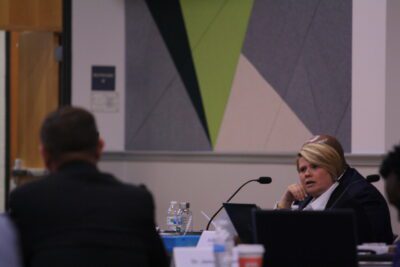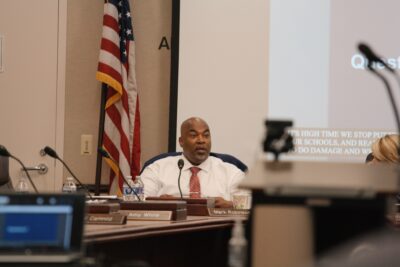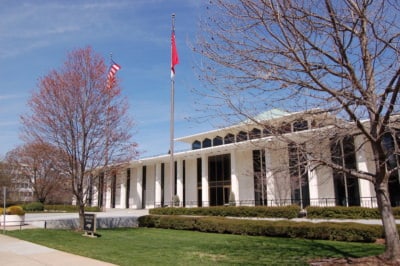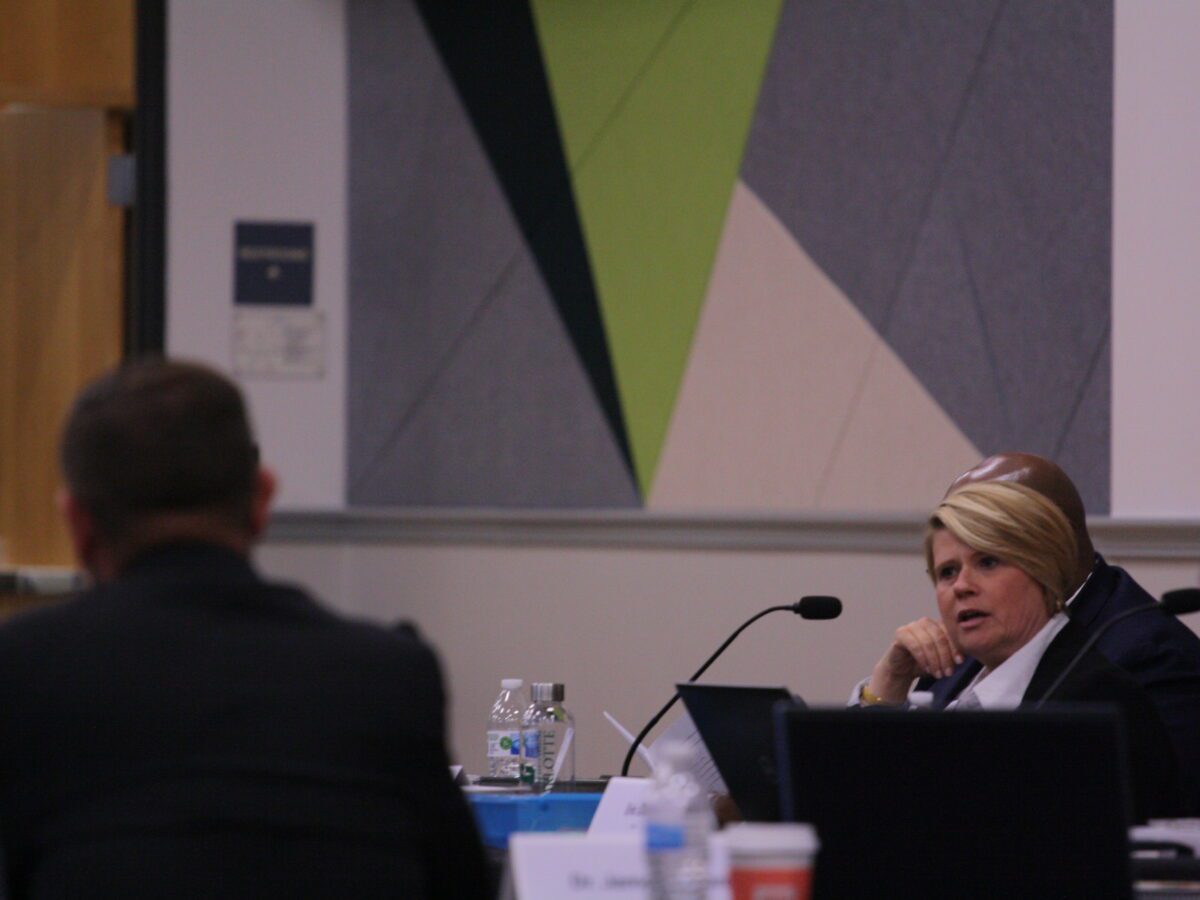

|
|
The N.C. Department of Public Instruction (DPI) does not anticipate the Republican-proposed expansion of private school vouchers will significantly impact public school enrollment, DPI Director of Government Affairs Jamey Falkenbury told State Board of Education members on Wednesday.
In states where similar legislation has been passed, Falkenbury said there was a 0-5% increase in public school students moving to private schools. Additionally, in North Carolina, the majority of private schools have told DPI they have waitlists, he said, or very few remaining spots.
State Superintendent Catherine Truitt said it is most likely that the proposed expansion of the Opportunity Scholarship Grant Program will be used by families already in private schools.
“What we’re saying is that there are not enough places in private schools for new families to leave their public schools and avail themselves of private schools,” she said.
The Republican-led Senate released its budget proposal last month, touting an emphasis on school choice expansion.
The budget would add more in recurring funding to expand private school vouchers through the Opportunity Scholarship Grant Program over the biennium than it would add to implementing its proposed teacher salary schedule, by about $27 million.
With the additional allocations, the Senate’s revised net appropriation for the Opportunity Scholarship Grant Reserve is $636 million over the next two years. The budget also proposes an additional $11 million to fund additional vouchers in 2023-24 and removes all income eligibility requirements for recipients, starting with the 2024-25 school year.
A fiscal note from the Office of State Budget and Management (OSBM) published last month said the proposal would decrease total state funding for public schools by $203.8 million if 50% of new Opportunity Scholarship recipients previously attended public school.
On Wednesday, Falkenbury said that 50% number seems unlikely based on trends in other states.
However, he said DPI is still discussing how to make sure essential baseline funding does not decrease as a result of the expansion.
“There’s a baseline that it costs to run the school no matter how many students you have there,” he said. “Those are the conversations that the General Assembly is going to be having over the next two years as we see what the interest is in the program.”
As EdNC previously reported, in other states where significant policy changes are implemented that could impact average daily membership (ADM), stabilization funds have been proposed for districts.
Board member Jill Camnitz said that either way, the investment in vouchers could be going toward public education.
“The bottom line to me here still is that there is large amounts of money being put in this pot, whether it gets used or not,” Camnitz said. “This money could be used for other much more dire educational needs across our state, but it it not.”
Falkenbury also discussed the Senate budget’s provision instructing DPI to develop a funding in arrears model, which means public school funding would initially be based on the actual average daily membership (ADM) from the prior school year, instead of projections for the upcoming school year.
The provision would enable school districts to have better resource planning, DPI said, and schools would not see a reduction in funding if the ADM were less.
Under the proposal, DPI would have to distribute funding in arrears starting with the 2024-25 school year.
Falkenbury said DPI does not expect to see the full impact of these changes until the 2025-26 school year. The change allowing current private school students to be eligible for opportunity scholarships takes place in 2024-25, when the DPI is also expected to distributing funding in arrears, per the Senate budget proposal.
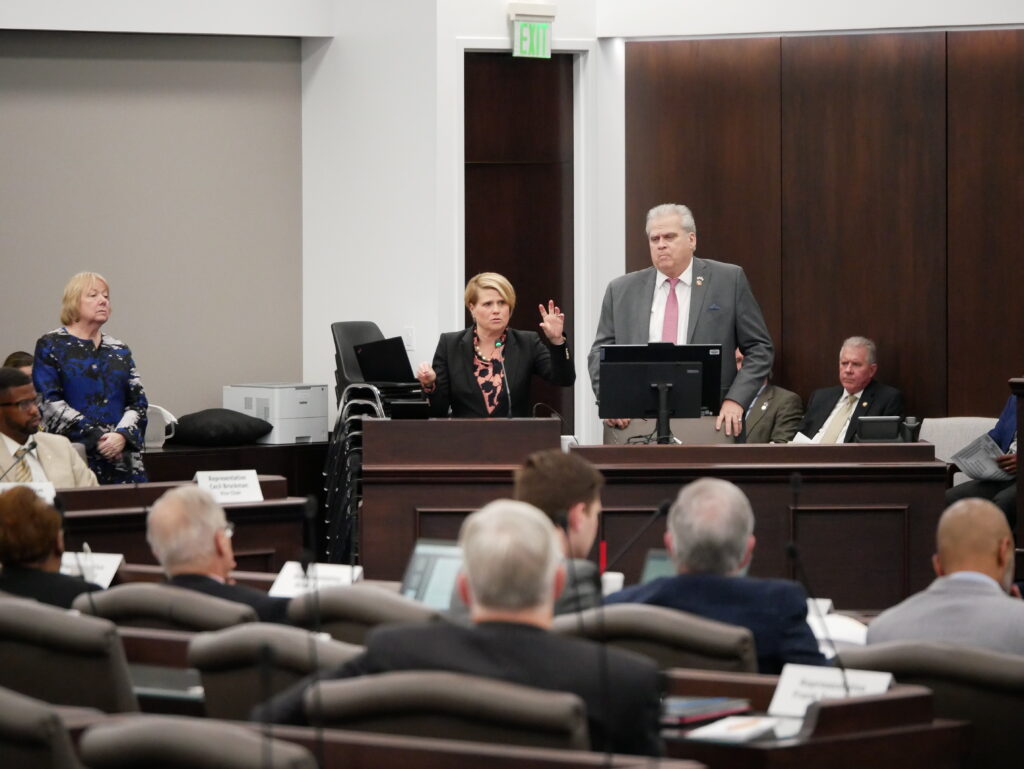

Other education legislation
During the Board’s meeting on Wednesday, Truitt went to the General Assembly to talk about House Bill 142.
The bill – which increases the penalties for sex offenses against students and taking indecent liberties with students to a Class G felony – passed the House on March 29 and was re-referred to the Senate committee on education on Wednesday.
Truitt, who requested the bill, told the judiciary committee that the state revokes about 20 teacher licenses per year for a variety of sexual misconduct offenses in schools.
“The overwhelming majority of teachers will never come anywhere close to violating the rights of students,” she told lawmakers in February. “But I firmly believe that one violation is too many, and I believe that we can do more to ensure our schools remain safe for students to learn and grow.”
HB 142 would further require administrators to report terminations or resignations to the State Board of Education within five days, with failure to do so as a Class I felony. Another part of the bill includes development of an informational video for students in grades 6-12 to teach them about sexual misconduct, beginning in the 2024-25 school year.
On Wednesday, the Senate redistricting and elections meeting also approved several bills seeking to increase the number of partisan boards of education in the state:
- HB 31: This bill provides for partisan elections for the members of the Rowan-Salisbury Board of Education.
- HB 308/SB 233: This bill would require Alexander County to conduct a referendum on whether to change election method for the board of education from nonpartisan to partisan.
- HB 66/SB 72: This bill provides for partisan elections for the Catawba County, Hickory City, Newton-Conover City, and Polk County boards of education.
Each of those bills also passed the Senate rules committee on Thursday and must now go before the full Senate. HB 179, which would make Pamlico County’s Board of Education partisan, was removed from the redistricting and elections committee’s calendar in place of HB 66.
Of those 83 school districts that had elections last November, 41 were partisan races, EdNC previously reported. Prior to 2013, there were only 10 partisan school districts in the state.
On Wednesday, Sen. Natasha Marcus, D-Mecklenburg, said the move is bad for public education.
“This is one more bill that is joining the march toward injecting partisanship into every election, even school board elections that have been happily operating on a nonpartisan basis up until now,” she said. “I think that’s the wrong way to go. But I understand, as we said before, this train seems to have left the station this session, and we’re just determined to make everything about politics and partisanship.”
There are a number of bills that made crossover which provide statewide flexibility in adopting the school calendar.
On Wednesday, the Board discussed its report to the General Assembly on school start and end dates. That report lists the start and end date for each N.C. public school, along with the statutory reference for any dates that fall outside of the current calendar requirements.
Supplemental funds report
In fiscal year 2021-22, the state appropriated $100 million for salary supplements to teachers and instructional support in eligible districts.
On Thursday, the Board approved its report to General Assembly on supplemental funds for teacher compensation, which details how those funds were spent.
Much of the Board’s discussion of the report concerned 20 low-wealth school districts that could lose $37 million in 2024 due to differing interpretations about how to use those state funds to boost teacher pay.
The General Assembly said districts could not use state dollars to replace local ones, which DPI interpreted to mean districts were required to maintain the same level of salary supplement expenditures from local and federal funds in fiscal year 2021 and 2022.
Although both the House and the Senate budgets for the 2023-2025 biennium support DPI’s interpretation, without direction from legislature there is lack of clarity. For those LEAs that have been determined to have supplanted, there is significant financial impact to the district and ultimately the teachers in their districts. The impact on the LEAs listed below is a cumulative loss of 2024 funding of estimated $37 million, and an allowance to remedy the deficiency is a $6.6 million impact.
DPI’s Report on Supplemental Funds for Teacher Compensation
On Thursday, along with approving the report, the Board approved an endorsement of forgiveness for those 20 districts.
“Some interpretation of language in the statute has been difficult for a number of districts,” Vice Chairman Alan Duncan said. “The consequences are significant.”
Digital learning, teacher prep, bonuses, and more
The Board approved 18 proposals through a grant program under the state’s Digital Learning Initiative, according to a DPI release.
The state-funded grants will support the development of innovative local digital learning models, with the goal of having effective digital learning practices across all N.C. K-12 public schools.
“These grants are such a critical way we continue providing digital teaching, learning supports, and resources for North Carolina’s districts, educators, and students,” Truitt said in the release. “I commend these districts for their support of digital innovation and desire to incorporate technology into the classroom. These grants will make a difference in the way we equip our students for the rapidly changing, technologically driven world that they will soon enter.”
The grant initiative was authorized in 2016 by the General Assembly as part of collaboration between the State Board of Education and the Friday Institute for Educational Innovation at N.C. State University to advance the state’s Digital Learning Plan. The recipients of the grant will receive awards ranging from $30,000 to $95,000.
In recent months, the Board has approved for many community colleges to offer the Elementary Education Residency Licensure Certificate Program, effective fall 2023.
On Thursday, Central Carolina Community College was also offered initial authorization to offer the program.
Those new programs make teacher licensing more affordable and convenient by allowing prospective teachers to take classes at local community colleges, according to a February release from the N.C. Community College System (NCCCS). Historically, the vast majority of N.C. teachers come from the UNC System.
The Board also approved a federal provision, Veterans Auto and Education Improvement Act of 2022, as an amendment to the state’s general licensure requirement.
The amendment allows veterans or spouses of a veteran with a teachers license from another state to be placed on the N.C. teacher salary schedule during their military service. Among other things, the license from another jurisdiction must have been used in last two years in the same position as the N.C. job being sought.
The Board also discussed its report to the General Assembly on the state’s teacher bonus program. You can view the presentation about that report here, which will be voted on at a later meeting.
Draft 3 of the K-12 Science Standards were presented to the Board on Wednesday, which you can view here. Those standards are set to be voted on in July. If approved, the standards would go into effect during the 2024-25 school year.
Awards and goodbyes
The Board also hosted several celebrations on Thursday, including recognition of its outgoing State Board advisors, Long Leaf Pine Award Winner Sherry Thomas, National Road Safety Foundation’s Teacher of Excellence Award Winner Sandra Dunbar, and outgoing State Board Member Amy White, who announced her resignation from the board last month.
During her last meeting as a Board member, White urged her colleagues to fight for a bright future for public education – focused on students, teacher pay, rebuilding trust in public schools, and responsibility and recovery.
The Board honored White with a resolution on Thursday morning.
“If you keep students first,” White said, “the decisions will always be right.”
Each outgoing Board advisor made remarks, which Chair Eric Davis requested be made available online, so that all public educators can read their “many words of sound advice.”
“In this work of education, you can either choose to be a bridge, or a barrier – on any given day or moment. Being a bridge requires constant conversation, reflection, and consideration,” said Eugenia Floyd, the 2021 Burroughs Wellcome Fund NC Teacher of the Year. “It is our job to do all of this work for children … and make education everything that it can be for the 1.5 million students in North Carolina public schools.”



